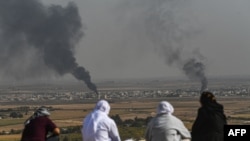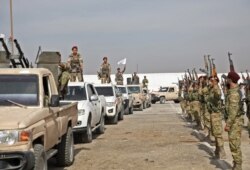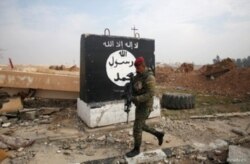U.S. defense intelligence officials are offering a sobering assessment of the impact Turkey's incursion into northeastern Syria — and corresponding moves by the U.S. and other powers — will have on efforts to destroy the Islamic State terror group.
The consequences of the Turkish offensive "will provide the group with time and space to expand its ability to conduct transnational attacks targeting the West," the Defense Intelligence Agency told the Defense Department's inspector general.
Turkey launched its air and ground offensive into Syria last month, after U.S. President Donald Trump ordered about 50 U.S. special operation troops to pull back from several outposts, saying it intended to clear the border region of terrorists.
But rather than target Islamic State, the Turkish operation targeted Kurdish militias, which Ankara views as terror groups, but which also had been fighting as part of the U.S.-backed Syrian Democratic Forces [SDF] to defeat IS cells and networks in the area.
As a result, officials fear IS, also known as ISIS or Daesh, is now getting a badly needed reprieve.
"As of the completion of this report in mid-November, it was unclear how many of the roughly 100,000 SDF forces were still conducting counter-ISIS operations in northeastern Syria," according to the inspector general's quarterly report, released Tuesday.
"ISIS was likely to exploit the reduction in counterterrorism pressure to reconstitute," Principal Deputy Inspector General Glenn Fine added, citing the DIA.
Specifically, officials at the DIA and with the U.S.-led anti-IS coalition voiced concerns that Turkey's incursion, combined with the subsequent withdrawal of U.S. forces from bases across northeastern Syria, has created the type of instability in which IS has traditionally flourished.
Already, officials are seeing signs IS has started to operate more freely, activating sleeper cells to increasingly attack the SDF, while also increasing outreach to its 19 branches and affiliates around the globe.
The longer-term consequences could be equally grim.
"The DIA assessed that absent counterterrorism pressure in Syria, ISIS would probably have an opportunity to regain control of some Syrian population centers and to be better postured to launch external attacks and expand its global footprint," the report said.
The warnings, while worrisome, are just the latest from current and former U.S. officials about the growing threat posed by IS, despite the defeat of its self-declared territorial caliphate in Syria earlier this year.
Just this month, the acting director of the U.S. National Counterterrorism Center said at least 14,000 IS fighters remain at large in Iraq and Syria, part of an insurgency that is "alive and kicking."
"We think it's substantially higher than that," Russell Travers told an audience in Washington of IS's fighting force, adding, "That number is going to do nothing but grow."
U.S. and Kurdish officials also have warned IS could get a boost from 10,000 to 15,000 fighters being held in temporary, makeshift prisons run by the SDF.
While the inspector general's report found fewer than 200 IS prisoners escaped SDF custody as a result of the Turkish incursion into northeast Syria, it concludes the situation remains precarious.
Both U.S. and SDF officials have repeatedly said the prisons, some now packed beyond capacity, cannot hold the fighters indefinitely.
There is also little hope that other military forces now operating in northeastern Syria — whether backed by Turkey, the Syrian regime or Russia — will offer much help.
"Some militias backed by Turkey previously helped to smuggle ISIS fighters across borders and probably maintain low-level tactical ties to ISIS," the report warned, citing the DIA.
Forces loyal to Syrian President Bashar al-Assad are likewise proving to be of little threat to IS.
"Although pro-regime forces regularly clash with ISIS in parts of southeastern Syria, they likely lack the will to carry out meaningful operations to ensure an enduring defeat of ISIS in northeastern Syria," the DIA told the Defense Department's inspector general.
IS in Iraq, Afghanistan
The situation in Iraq, while not as tumultuous as in Syria, is also uncertain, defense officials said.
Iraq's military is "unable to retain control of territory cleared of ISIS in Salah ad Din province, and has limited access to ISIS support zones in both Salah ad Din and Diyala provinces," the report found.
Additionally, Iraqi forces remain "largely unwilling or incapable of holding terrain in the mountains and central and southern wadis of Kirkuk province," the U.S.-led coalition said.
Meanwhile, officials in Afghanistan claimed a major success Tuesday against IS, with President Ashraf Ghani telling a gathering in Jalalabad that the terror group's Afghan affiliate has been destroyed.
"We have obliterated Daesh," he said.
"Our strategy worked out very well," Shah Mahmoud Miakhel, the provincial governor of Nangarhar province, added. "It's not possible that they once again equip themselves in other areas of Afghanistan and threaten other parts of the country."
U.S. officials late Tuesday were looking into the claims.
IS's Afghan affiliate, also known as IS-Khorasan, has long been considered one of the terror group's more dangerous branches, with an estimated 4,000 to 5,000 fighters and ambitions to launch attacks against the West.
Some information from Reuters was used in this report.









